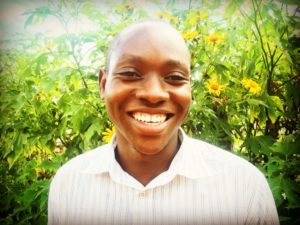by Kate McAuliff

Mission: Restore is thrilled to introduce our newest team member: Martine Chapty Maswi. I’ve had the pleasure of working with Martine since my return to Tanzania, and from our first meeting he has been bursting with energy and ideas about how Mission: Restore can continue to implement, evaluate, and expand our programming. After pouring over laptops and notes, I asked Martine about his first few weeks of working for Mission: Restore – and casually asked him to tell me his life story so I can share it with all of you!
“I am happy to join the Mission: Restore team,” Martine tells me. “I’m so impressed with what they are doing in Tanzania, and I want to encourage their work because it is sustainable… I expect to learn a lot from you as well as for you to learn a lot from me!”
Martine wears many hats in his work with us. He assists in operations, program evaluation, and is our go-to Swahili translator and interpreter. Most importantly, Martine, being Tanzanian, is our cultural liaison and advisor. One of Martine’s most important qualities is his honesty and advice as we ensure our programming and activities align and respect Tanzanian culture and customs. When I asked him about how he feels in this position he told me, “I’m proud that you are getting to experience Tanzania through me.”
Martine is originally from the Mara Region of Tanzania, although he was born in the Mpwapwa District of the Dodoma Region. After his schooling in Mara, he went to the University of Dar Es Salaam. There, he earned his Bachelor of Science in Computers and his Masters of Engineering in Project Management. Since his graduation, he has worked with multiple organizations, businesses, and hospitals. His experience working with international NGOs and within the Tanzanian medical system makes him a perfect fit for Mission: Restore. And we’re proud to be the first American organization he has worked with!
When Martine isn’t working, he loves to watch football (meaning soccer, not American football!), and he’s a Manchester United fan. He also tells me that he loves music, especially the Tanzanian artists Bongo Flava and Lady Jaydee. He also loves the band Coldplay.
Finally, I ask Martine about his aspirations for his, clearly bright, future. He says he sees himself working in medical research. He says, “In the health management system on Tanzania, we have a lot of challenges… I have a dream one day that through my research and my reports all of these challenges can be changed and Tanzania can reach international standards of medicine.” When I asked Martine what it is about research that makes it a catalyst of change, he tells me, “It’s where we see the real situation of what we only imagined before.”
I know that with Martine and the other members of our team here in East Africa, we will continue to understand the ‘real situation’ of the barriers to surgical care; and use that knowledge to respond to the surgical training needs and opportunities of Mwanza, Tanzania, East Africa, and beyond.

Recent Comments